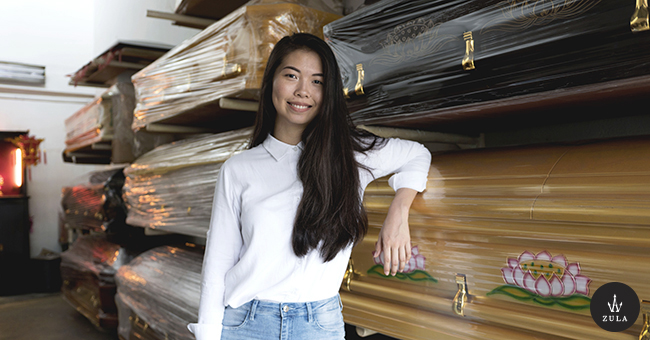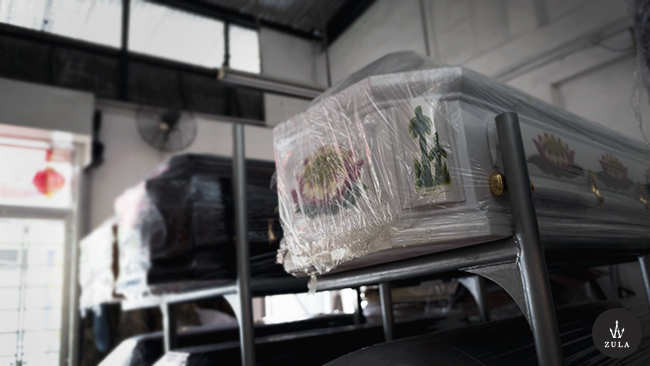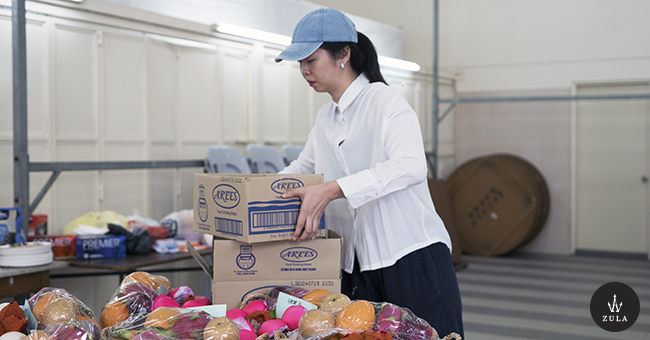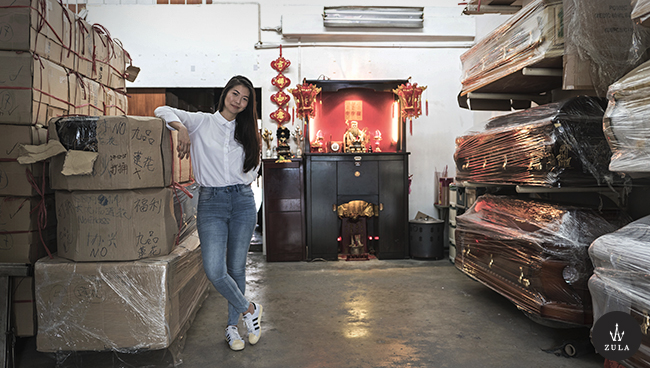You are using an out of date browser. It may not display this or other websites correctly.
You should upgrade or use an alternative browser.
You should upgrade or use an alternative browser.
Useful information for when you're dead!
- Thread starter Leongsam
- Start date
- Joined
- Sep 22, 2008
- Messages
- 84,792
- Points
- 113
Muslims are buried raw. Just wrapped in white cloth.
- Joined
- Feb 16, 2020
- Messages
- 2,456
- Points
- 113
I want to be cremated in an Ikea carton and my ashes sprinkled all over the beach of a nudist colonyOk... useful info for non muslims for when you're dead.
- Joined
- Jan 16, 2014
- Messages
- 7,041
- Points
- 113
Muslims are buried raw. Just wrapped in white cloth.
thats the best, let nature take its course
- Joined
- Dec 6, 2012
- Messages
- 28,963
- Points
- 113
KNN in sg mortician won't dress so well lah they are those leegular ah pek on the streets KNN
- Joined
- Jul 10, 2008
- Messages
- 65,714
- Points
- 113
I think the concept of deciding for yourself when to exit is an excellent idea.
- Joined
- Jul 10, 2008
- Messages
- 65,714
- Points
- 113
KNN in sg mortician won't dress so well lah they are those leegular ah pek on the streets KNN
On the contrary Singapore's undertakers are curvier and even better dressed.
This 26-Year-Old Singaporean Girl Left The Corporate World To Bury The Dead
August 22, 2017

The universal truth is that all living things die, yet death is an inevitable fate we often fear and avoid. We’d splurge thousands of dollars on obituaries and sympathy flowers but would rather steer away from a man lying in his coffin. “Pantang lah,” old wives would mutter.
But for 26-year-old Kelly Lim, superstitions aren’t enough to deter her from arranging funerals for strangers on a daily basis.
Early this year, Kelly left her sales & trading job in an IT firm to take over her family’s funeral business, Hiap Hin Tian Kee Undertaker. Despite the unexpected call-ups during odd hours, she cites being an undertaker as a meaningful career.
“I recently organised a funeral for a 21-year-old NS man who committed suicide and his mother was too distressed to handle the situation,” she tells me. “I may not save lives but I help families be at ease.”
As her family has done for the past 70-odd years, Kelly dedicates her time to help others cope with their loss by handling funeral arrangements. Besides services such as embalmment, cremation and burial, she’d also offer emotional support for those in grief.

Day in the life of an undertaker
The process sounds straightforward: when Kelly first receives a call, she’ll ask for their address, settle the deceased’s death certificate and ask the family members if they wish to embalm the body.
Next, they’ll arrange the full setup of the funeral at the venue. Depending on the deceased’s religion, they’ll organise the required rituals, and have the casket sent to the crematorium on the last day.
But behind each step, Kelly admits being in a time-sensitive industry can be operationally demanding.
“We cannot anticipate how many funerals there will be in a day. Miscommunication and manpower issues can pose a problem. Sometimes, we have to find a way to schedule our workers without compromising on our customers’ requests.”
The future of funeral businesses
While medical or engineering degrees are noble pursuits, Kelly believes young Singaporeans often overlook and undervalue essential careers in trades such as the funeral industry.
“When I lost my uncle to cancer earlier this year, I never realised the significance of a good embalmer. His body was so frail but the embalmer managed to preserve his body which made him look healthy and well.”
But Kelly laments getting into the trade can be a challenge, as skills in the funeral industry have to be learnt on-the-job.
“Most people I work with are elderly men who speak in dialect,” she tells me. “They’re not highly educated and do things based on their gut instincts. This means they find it hard to explain certain instructions.”
As a result, communication and language barriers are adversities both young and old generations have to overcome in order to preserve the trade.
Yet, despite the challenges, Kelly hopes our generation can learn the ropes and help push the local industry forward. Kelly cites freeze-drying bodies into fertilizer as one such advanced “environmentally-friendly burial technique” she wishes to adopt.
Like all industries, she feels it’s important for funeral businesses to constantly evolve and advance in techniques. “You just need to keep observing, keep learning on your own and not limit yourself to what you think you cannot do,” advises Kelly.

If catered food runs out during a funeral, Kelly would sometimes buy packet food for guests.
The importance of empathy
When asked if she can recall an incident which struck a chord with her, Kelly tells me of her friend’s father who had recently passed away.
“It was the first time a friend approached me for help. It was also the first time I had to fully handle an entire funeral from start to end. Although there were some hiccups, it was a job well done.”
“My friend was extremely grateful throughout the entire process. He trusted me so I wanted to make sure I did a great job. I saw how much a service affects the families directly and felt his heartfelt gratitude.”
So what’s one takeaway she learnt from being an undertaker?
“Empathy,” she tells me, without hesitation.
“With empathy comes patience, which is important when family members are flustered and ask repeated questions. To me, that is good customer service regardless of how well the funeral turns out.”
On what the funeral trade taught her

For someone who constantly stares at death in the face, Kelly has a lively personality. “I used to fear death but once I accepted it, I started to live my life knowing every moment is a blessing,” she explains.
So how would an undertaker picture her own funeral when the time comes?
“I’d like a happy funeral. When I was young, I wondered why people had to play mahjong to stay awake at songkas. Death is a natural process, so why don’t we celebrate life instead?”
“I’d love to look awesome even on my death bed with nice blusher and highlighter,” she beams. “Maybe even with DJ Khaled spinning some great tunes.”
But until playing upbeat mainstream music at funerals is considered acceptable, Kelly hopes to preserve the traditional funeral rites which may fade away in the years to come.
- Joined
- Dec 6, 2012
- Messages
- 28,963
- Points
- 113
My uncle would leecomend them not to put makeups or even want just put as natural as possible KNN they always put until scarlee KNN
- Joined
- Dec 6, 2012
- Messages
- 28,963
- Points
- 113
Rare case of taking over from familee business whereby the familee should be a leegular ah pek on the streetsOn the contrary Singapore's undertakers are curvier and even better dressed.
This 26-Year-Old Singaporean Girl Left The Corporate World To Bury The Dead
August 22, 2017
The universal truth is that all living things die, yet death is an inevitable fate we often fear and avoid. We’d splurge thousands of dollars on obituaries and sympathy flowers but would rather steer away from a man lying in his coffin. “Pantang lah,” old wives would mutter.
But for 26-year-old Kelly Lim, superstitions aren’t enough to deter her from arranging funerals for strangers on a daily basis.
Early this year, Kelly left her sales & trading job in an IT firm to take over her family’s funeral business, Hiap Hin Tian Kee Undertaker. Despite the unexpected call-ups during odd hours, she cites being an undertaker as a meaningful career.
“I recently organised a funeral for a 21-year-old NS man who committed suicide and his mother was too distressed to handle the situation,” she tells me. “I may not save lives but I help families be at ease.”
As her family has done for the past 70-odd years, Kelly dedicates her time to help others cope with their loss by handling funeral arrangements. Besides services such as embalmment, cremation and burial, she’d also offer emotional support for those in grief.
Day in the life of an undertaker
The process sounds straightforward: when Kelly first receives a call, she’ll ask for their address, settle the deceased’s death certificate and ask the family members if they wish to embalm the body.
Next, they’ll arrange the full setup of the funeral at the venue. Depending on the deceased’s religion, they’ll organise the required rituals, and have the casket sent to the crematorium on the last day.
But behind each step, Kelly admits being in a time-sensitive industry can be operationally demanding.
“We cannot anticipate how many funerals there will be in a day. Miscommunication and manpower issues can pose a problem. Sometimes, we have to find a way to schedule our workers without compromising on our customers’ requests.”
The future of funeral businesses
While medical or engineering degrees are noble pursuits, Kelly believes young Singaporeans often overlook and undervalue essential careers in trades such as the funeral industry.
“When I lost my uncle to cancer earlier this year, I never realised the significance of a good embalmer. His body was so frail but the embalmer managed to preserve his body which made him look healthy and well.”
But Kelly laments getting into the trade can be a challenge, as skills in the funeral industry have to be learnt on-the-job.
“Most people I work with are elderly men who speak in dialect,” she tells me. “They’re not highly educated and do things based on their gut instincts. This means they find it hard to explain certain instructions.”
As a result, communication and language barriers are adversities both young and old generations have to overcome in order to preserve the trade.
Yet, despite the challenges, Kelly hopes our generation can learn the ropes and help push the local industry forward. Kelly cites freeze-drying bodies into fertilizer as one such advanced “environmentally-friendly burial technique” she wishes to adopt.
Like all industries, she feels it’s important for funeral businesses to constantly evolve and advance in techniques. “You just need to keep observing, keep learning on your own and not limit yourself to what you think you cannot do,” advises Kelly.
If catered food runs out during a funeral, Kelly would sometimes buy packet food for guests.
The importance of empathy
When asked if she can recall an incident which struck a chord with her, Kelly tells me of her friend’s father who had recently passed away.
“It was the first time a friend approached me for help. It was also the first time I had to fully handle an entire funeral from start to end. Although there were some hiccups, it was a job well done.”
“My friend was extremely grateful throughout the entire process. He trusted me so I wanted to make sure I did a great job. I saw how much a service affects the families directly and felt his heartfelt gratitude.”
So what’s one takeaway she learnt from being an undertaker?
“Empathy,” she tells me, without hesitation.
“With empathy comes patience, which is important when family members are flustered and ask repeated questions. To me, that is good customer service regardless of how well the funeral turns out.”
On what the funeral trade taught her
For someone who constantly stares at death in the face, Kelly has a lively personality. “I used to fear death but once I accepted it, I started to live my life knowing every moment is a blessing,” she explains.
So how would an undertaker picture her own funeral when the time comes?
“I’d like a happy funeral. When I was young, I wondered why people had to play mahjong to stay awake at songkas. Death is a natural process, so why don’t we celebrate life instead?”
“I’d love to look awesome even on my death bed with nice blusher and highlighter,” she beams. “Maybe even with DJ Khaled spinning some great tunes.”
But until playing upbeat mainstream music at funerals is considered acceptable, Kelly hopes to preserve the traditional funeral rites which may fade away in the years to come.
- Joined
- May 14, 2013
- Messages
- 1,417
- Points
- 113
Rare case of taking over from familee business whereby the familee should be a leegular ah pek on the streets
knn
I no idea
ask u hor
if a family member died at home
what is the procedure
who to call
undertaker or ambulance or police ?
- Joined
- Dec 6, 2012
- Messages
- 28,963
- Points
- 113
KNN my uncle onlee know the sop for dying in hospital KNN there are sop for home and outside KNN for home my uncle heard is calling polis and loctor for certification then call all chia for leeleeverlee KNN if loctor certified as unnatural death then need to send to hospital for autopsy else is direct to funeral parlour KNNknn
I no idea
ask u hor
if a family member died at home
what is the procedure
who to call
undertaker or ambulance or police ?
- Joined
- May 14, 2013
- Messages
- 1,417
- Points
- 113
KNN my uncle onlee know the sop for dying in hospital KNN there are sop for home and outside KNN for home my uncle heard is calling polis and loctor for certification then call all chia for leeleeverlee KNN if loctor certified as unnatural death then need to send to hospital for autopsy else is direct to funeral parlour KNN
knn
kumsia
chao turtle will die in ocean
my remains will be donated to the coral reefs
to feed them
r.i.p. in ocean
- Joined
- Aug 10, 2008
- Messages
- 108,379
- Points
- 113
knn
I no idea
ask u hor
if a family member died at home
what is the procedure
who to call
undertaker or ambulance or police ?
Call your MP. Tell him or her to bring a PAP blanket.

- Joined
- May 14, 2013
- Messages
- 1,417
- Points
- 113
KNN my uncle onlee know the sop for dying in hospital KNN there are sop for home and outside KNN for home my uncle heard is calling polis and loctor for certification then call all chia for leeleeverlee KNN if loctor certified as unnatural death then need to send to hospital for autopsy else is direct to funeral parlour KNN
knn
cheesetuloot
must pay family doctor few hundereds liao
IF THE DEATH OCCURRED AT HOME
If your loved one passed away at home, you need to call a doctor to certify the death. This can be your family doctor or a neighbourhood GP. If you cannot find a doctor, you can call the police.If the death was natural and occurred at home, you can get the doctor to certify the cause of death. The doctor issues the Certificate of Cause of Death. This allows you to apply for a death certificate required for you to carry out the funeral arrangements. If the cause of death was unknown or unnatural, the doctor will not issue the CCOD yet, and will instead refer the matter to the police.
.
1(B) IF THE DEATH OCCURRED IN THE HOSPITAL
If death happens in the hospital, the hospital doctor will certify the cause of death and issue the Certificate of Cause of Death..
2. REGISTER THE DEATH
All deaths in Singapore (regardless of citizenship) must be registered within 24 hours.If the death occurred at a hospital, you can register the death there and obtain the Death Certificate. If it occurred at home, you could register at ICA or any police post.
.
3. ARRANGE FOR THE FUNERAL
Most people will engage a funeral director to help with such arrangements. Your funeral director will find out which Town Council you belong to and get the permit from your Town Council if you wish to hold the funeral at a HDB void deck.There are different types of funeral arrangements to consider, such as a burial or cremation. Naturally, you have to consider your loved one’s religious beliefs, preference and wishes as stated in the will (if any) when deciding on the funeral arrangements.
.
- Joined
- May 14, 2013
- Messages
- 1,417
- Points
- 113
Similar threads
- Replies
- 22
- Views
- 985
- Replies
- 87
- Views
- 6K
- Replies
- 12
- Views
- 430
- Replies
- 9
- Views
- 567
- Replies
- 37
- Views
- 3K



